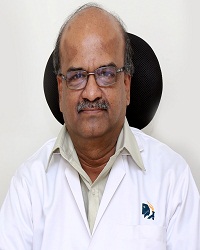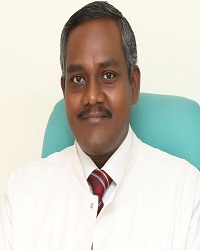Search Result: 3

Dr Alagappan M
MBBS, D.(Ortho)
Registration No
178871
Language
English, தமிழ்

24 years experience overall

KK Nagar , Madurai
MON- SAT(03:30 PM-05:30 PM)

Dr Johnedmund Benny E
M.S. FASM (Arthroscopy-ISAKOS); FIA(Arthroplasty); FIJR (Germany); FISS (France); FIRh (France)
Registration No
2756943
Language
English, हिंदी, ಕನ್ನಡ, മലയാളം, தமிழ்

14 years experience overall

KK Nagar , Madurai
MON- SAT, MON- SAT(10:00 AM-03:00 PM)

Dr Rajapandian K
MBBS, D.Ortho, DNB Ortho, MNAMS MBBS, Diploma in Orthopaedics, DNB – Orthopedics / Orthopedic Surgery / Orthopedist / Spine Surgeon (Ortho)
Registration No
30948
Language
English, हिंदी, ಕನ್ನಡ, മലയാളം, தமிழ்

22 years experience overall

KK Nagar , Madurai
MON- SAT, MON- SAT(10:30 AM-02:30 PM)
Frequently Asked Questions for Total Knee Replacement in Madurai
Generally, patients over 50 are recommended for knee replacement surgery. However, there is no specific age limit required for this surgery. It depends on the individual’s overall health, severity of symptoms, and impact on quality of life. Your doctor will evaluate your situation and determine the best course of action.
After knee replacement surgery, it is crucial to follow your doctor’s instructions for post-operative care, including physical therapy and medication. Regular exercise and maintaining a healthy weight are also important for long-term success.
Yes, after a successful total knee replacement, most patients can walk normally without pain or limitations. However, it may take time and rehabilitation to regain strength, balance, and confidence in walking.
The fastest way to recover from knee surgery is to follow your doctor’s instructions, participate in physical therapy, managing pain, and take wound care. Maintaining a healthy lifestyle, including a balanced diet and regular exercise, can also speed your recovery.
While most patients experience significant improvement after knee surgery, there can be long-term complications such as infection, blood clots, stiffness, implant wear, instability, nerve or tissue damage, or loosening over time. You may also experience a reduced range of knee motion.
After a full recovery from total knee replacement, most patients can achieve a range of motion between 110 and 120 degrees if they do not have any pre-existing stiffness or other complications. This allows activities like walking, climbing stairs, and getting up from a chair comfortably.
Eligibility for total knee replacement depends on the severity of knee pain, limited mobility, and response to conservative treatments like medication and physical therapy. Also, it is recommended if you have arthritis, osteoarthritis, rheumatoid arthritis, posttraumatic arthritis, or fractures.
Several hospitals specialise in orthopaedic surgeries, including total knee replacement. The best choice would be one with a dedicated orthopaedic department, experienced surgeons, modern facilities, and a good track record of successful knee replacement surgeries.
Total knee replacement surgery can take around 1–2 hours, depending on the complexity of the operation.
• Medical evaluations
• Blood tests and an ECG (electrocardiogram)
• Imaging tests that include a CT scan, X-rays of the knees, and an MRI
• Food and medication regulations
• The post-procedure care after a total knee replacement includes
• Proper rest and walking with support later on.
• Avoid strenuous activities involving knee twisting, shocks, and pressure.
• Keep the legs elevated to prevent swelling.
• Maintain wound care and hygiene.
• Walking and home exercises as recommended by your doctor.
• Undergo physiotherapy for a faster recovery.
Before total knee replacement, your doctor will guide you through pre-surgical preparations like
The complete recovery after surgery may take several months to a year. However, you can resume your routine after six weeks of the surgery, during which physical therapy and rehabilitation are essential for the best results.
The success of total knee replacement is generally high, with over 90–95% of patients experiencing significant pain relief and improved knee function. However, individual outcomes depend on age, overall health, post-surgery rehabilitation, and knee condition.
To find the best doctors for total knee replacement, you can ask for references from your primary care physician, friends, family members, or other healthcare professionals. Additionally, online platforms and hospital websites often provide information about doctors’ qualifications and patient reviews that you can explore to make your selections.
Orthopaedic surgeons specialise in performing Total Knee Replacement surgeries. They have the necessary training and expertise to treat knee conditions, including arthritis, and experience in performing knee surgeries.
A doctor who performs total knee replacement should be an orthopaedic surgeon specialising in joint replacement surgeries. They should have completed their medical degree and specialization in Orthopedics and joint replacement surgery.
Total knee replacement, or knee arthroplasty, is a surgery to replace the damaged or worn-out knee joint with an artificial joint made of metal and plastic (prosthetic). It relieve pain and improve function in individuals with severe knee arthritis or other knee conditions.
Related Procedures in Madurai
- Doctors for Total Knee Replacement in Madurai
- Doctors for Hip Replacement in Madurai
- Doctors for ACL reconstruction surgery in Madurai
- Doctors for Laminectomy in Madurai
- Doctors for Arthrodesis in Madurai
- Doctors for Osteotomy in Madurai
- Doctors for Rotator cuff Tendinitis in Madurai
- Doctors for Knee Replacement Surgery in Madurai
- Doctors for Limb lengthening in Madurai
- Doctors for Ankle surgery in Madurai
Related Treatments in Madurai
- Doctors for ACL Injuries Treatment in Madurai
- Doctors for Arthritis Treatment in Madurai
- Doctors for Carpal Tunnel Syndrome Treatment in Madurai
- Doctors for Cerebral Palsy Treatment in Madurai
- Doctors for Ganglion Cyst Treatment in Madurai
- Doctors for Hemophilia Treatment in Madurai
- Doctors for Marfan Syndrome Treatment in Madurai
- Doctors for Muscular Dystrophy Treatment in Madurai
- Doctors for Psoriatic Arthritis Treatment in Madurai
- Doctors for Rheumatoid Arthritis Treatment in Madurai
- Doctors for Scleroderma Treatment in Madurai
- Doctors for Scoliosis Treatment in Madurai
- Doctors for Spina Bifida Treatment in Madurai
- Doctors for Spondylolisthesis Treatment in Madurai
- Doctors for Trigger Finger Treatment in Madurai
Other Specialities in Madurai
- Best Urologist in Madurai
- Best Pulmonologist in Madurai
- Best General Physician in Madurai
- Best Endocrinologist in Madurai
- Best Cardiologist in Madurai
- Best Oncologist in Madurai
- Best Radiologist in Madurai
- Best Orthopedics in Madurai
- Best Hepatologist in Madurai
- Best Gynecologist in Madurai
- Best Dermatologist in Madurai
- Best Gastroenterologist in Madurai
- Best Psychologist in Madurai
- Best Ent Specialist in Madurai
- Best Nephrologist in Madurai
- Best Rheumatologist in Madurai
- Best Diabetologist in Madurai
- Best Psychiatrist in Madurai
- Best Neonatologist in Madurai
- Best Dentist in Madurai
- Best Dietitian in Madurai
- Best Haematologist in Madurai
- Best Pediatrics in Madurai
- Best General Surgeon in Madurai
Top Hospitals in India
- Hospitals in Ahmedabad
- Hospitals in Bangalore
- Hospitals in Bhubaneswar
- Hospitals in Bilaspur
- Hospitals in Chennai
- Hospitals in Delhi
- Hospitals in Guwahati
- Hospitals in Hyderabad
- Hospitals in Indore
- Hospitals in Kolkata
- Hospitals in Madurai
- Hospitals in Mumbai
- Hospitals in Mysore
- Hospitals in Nashik
- Hospitals in Noida
- Hospitals in Visakhapatnam
- Hospitals in Lucknow
- Hospitals in Bhopal
- Hospitals in Karur
- Hospitals in Kochi
- Hospitals in Nellore
- Hospitals in Trichy
- Hospitals in Kakinada
© Copyright 2024. Apollo Hospitals Group. All Rights Reserved.




 Call Now
Call Now



